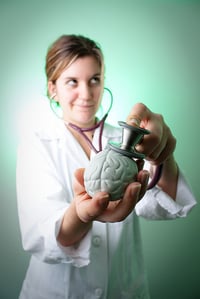- Privacy Policy
- Terms & Conditions
- Contact us
- ©Isabel Healthcare 2025
Why We need to Improve our Differential Diagnosis Processes
 Within the medical industry, a staggering 30-40% of all malpractice claims come down to a misdiagnosis. Why do people get it wrong? Because they’re just that: people. Clinicians and medical professionals have years and years of training - and most likely experience too - behind them, so there’s no doubting they’re the ones to be around when you’re unwell. But humans make mistakes, and the human brain is vulnerable to error. According to Mark Graber in 2005, cognitive error contributed to 74% of all diagnostic errors studied. There is a virtually endless list of the cognitive biases that affect humans, and medical professionals are unfortunately no exception to these biases. Arguable the main sticking points for those trying to diagnose a patient, or indeed find a solution to any question, are:
Within the medical industry, a staggering 30-40% of all malpractice claims come down to a misdiagnosis. Why do people get it wrong? Because they’re just that: people. Clinicians and medical professionals have years and years of training - and most likely experience too - behind them, so there’s no doubting they’re the ones to be around when you’re unwell. But humans make mistakes, and the human brain is vulnerable to error. According to Mark Graber in 2005, cognitive error contributed to 74% of all diagnostic errors studied. There is a virtually endless list of the cognitive biases that affect humans, and medical professionals are unfortunately no exception to these biases. Arguable the main sticking points for those trying to diagnose a patient, or indeed find a solution to any question, are:
Anchoring
Physicians use their gut instinct a lot when diagnosing, and it’s usually right, and it’s usually what makes them a great doctor. Being able to quickly diagnose a life-threatening illness is critical, and it has to be done under immense pressure. However, some of the time that gut feeling can be hiding a different diagnosis requiring different medical attention. Going with the first thing you think of and disregarding other options can lead to the wrong diagnosis, and this is known as anchoring.
Confirmation Bias
In some ways, confirmation bias is similar to anchoring, as it occurs when a physician fixates on and becomes convinced of the first or most apparent diagnosis that comes into their mind. However, confirmation bias takes things one step further, where the doctor will not only disregard other options, but look to confirm their own conviction. Physicians will search for signs and symptoms which confirm their initial thought, ordering tests to confirm their choice, rather than tests that could uncover underlying issues. This is called a confirmation bias.
Ambiguity Effect
When a patient first comes into the room, the only things you have to go on are the signs and symptoms. You can then begin to ask questions to expand on these, and this is the crucial stage to discovering and diagnosing. However, if a certain symptom is not present, or the right question was not asked, the correct diagnosis will remain a mystery. The ambiguity effect occurs when a diagnosis is not made due to one or more of the signs or symptoms not being apparent or discovered, so the diagnosis seems unlikely. Take for example, in our earlier blog, a patient from Washington suffering from Lyme Disease because they travelled up the East Coast of the US. If the question of travel history had not been asked of the patient, we may never have discovered it was in fact Lyme Disease.
There are many other contributing factors to cognitive error, and there are probably more that haven’t been discovered yet, but it’s clear that diagnosing is not a purely factual process, and humans are inherently flawed. For decades doctors have got around these issues through various solutions, such as getting multiple opinions to one patient. But today, as people live longer and more treatments are available if diagnosed early enough, and medical advancements take giant leaps forward, the question arises: are we doing enough to prevent misdiagnosis? And is our Differential Diagnosis good enough?
Isabel’s Differential Diagnosis
Computers have their limitations - being human also allows for empathy and thinking outside the box, whereas computers can only provide us with information based on data and facts. But they can hold a lot more information than the human brain, and more importantly, hold it without bias. So it can be agreed that on their own, both humans and computers have their flaws. However, if we can combine the mind of a highly trained physician, with all its complexities and experience, with the vast amount of unbiased knowledge of a computer system, surely the outcome is improved diagnoses? Using a system like Isabel to create a wide Differential Diagnosis, including rare and uncommon diseases that may have been missed, a physician is less likely to allow cognitive biases to cloud his judgment of the case in hand.
If you're interested in learning more about why and how we should be improving diagnosis decision making, download our whitepaper:
Image Attribution:

Jason Maude
Jason is the CEO and Co-founder of Isabel. Prior to co-founding Isabel, Jason spent 12 years working in finance and investment banking across Europe. His daughter, Isabel, fell seriously ill following a misdiagnosis in 1999 and this experience inspired Jason to abandon his city career and create Isabel Healthcare Ltd.
Subscribe Here!
Recent Posts
Isabel DDx Companion with ChatGPT Integration - to help you diagnose even faster
At Isabel Healthcare, we’ve always been driven by one goal: to make clinical reasoning faster,..Virtual Triage: Do more questions lead to better patient outcomes?
One of the common misconceptions related to virtual triage / symptom checker tools is that the more..List Of Categories
- Differential Diagnosis Decision Support
- Differential diagnosis
- Symptom Checker
- Symptoms
- Medical Error
- Patient Disease Information
- Disease
- Clinical Decision Support
- Diagnostic Decision Support
- Isabel 1 Minute Read
- Diagnosis Error
- Diagnosis Skills Cases
- Healthcare Informatics
- Clinical Reasoning
- Evidence-based Medicine
- Medical Education
- Patient Engagement
- Symptom Triage
- Nurse Practitioner Education
- Nursing Decision Support
- Partnership
- Public Health
- COVID-19
- EHR
- Patient Empowerment
- Patient Safety
- rare disease

Start your FREE Trial today
Try the Isabel Pro DDx generator for 30-days - no payment card details required.





